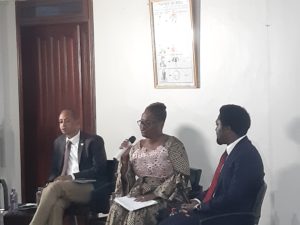
Accra, Ghana, August 17, 2019//-Dr Derrick Edem Akpalu, a Development and Democracy Fellow in the field of Public Health at the Center for Democratic Development (CDD-Ghana), a leading think-tank in Ghana and beyond, stated that clinical trial (CT) misconceptions in Ghana and other parts of Africa could be prevented if researchers are proactive.
According to him, by engaging the participants and communities in the clinical trials early through effective and efficient communications, these misconceptions would be addressed.
Dr Akpalu who is currently a scientist specializing in Pharmacokinetics and Pharmacodynamics at the Janssen Pharmaceutical Companies of Johnson & Johnson, in the USA, gave this advice at a roundtable on CT information and education in Accra recently.
In April this year, the World Health Organization (WHO) launched the world’s first malaria vaccine landmark pilot program and Ghana was one of three African countries in which the vaccine, was made available to children up to two years of age.
However, the commencement of the pilot program in Ghana received mixed reactions from the public, with some strong pushback from persons described by the media as anti-vaccine campaigners.
He said: “The public scepticism and suspicion about the vaccination program indicated that perhaps, the general Ghanaian public required additional education and information about the program prior to the rollout”
Other reasons Dr Akpalu attributed to the rising CT misconceptions are the lack of trust due to historical errors in medical research, sheer knowledge gap, lack of active engagement between patients and the other stakeholders in the conduct of CT before, during and after, and the use of ambiguous and technical language in clinical information.
Earlier presenting a paper titled-‘The Role of Digital and Social Media in Improving Clinical trial Notions in Ghana’, he advised researchers and health practitioners to be worried about the rapid dissemination of information either factual or inaccurate due to the ubiquity of social media.
How to address these misconceptions
Dr Akpalu who has over a decade of experience in biomedicine and clinical research, urged his colleagues in the field to be active on social media to enable them address these misconceptions on time.
He continued: “Effective CT planning, conduct and post-studying activities are intrinsically related to access to well-informed patient. Today’s clinical patient is an information seeking stakeholder who is actively utilizing social and digital content to fill this knowledge gap”.
“Social and digital media consumption offers researchers and physicians the opportunity to lead in the provision of accurate information to would-be participants”, Dr Akpalu urged.
Contributing to the panel discussion, Dr Susan Adu-Amankwah, a Clinical Research Coordinator at Ghana’s Noguchi Memorial Institute, Legon, however said that CT participants are always informed before conducting trials on them.
She admitted that the community or general participants always make things very difficult for clinical trial practitioners and researchers in the country.
On his part, Dr Divine Ndonbi Banyubala, a Deputy Registrar at the Medical and Dental Council, appealed to clinical researchers to disclose their interest before the research begins to reduce the pushbacks.
Kelvin Odonkor, a health blogger added that to reduce the CT scares in the country, testimonials or evidences are critical.
The roundtable was organized by the CDD-Ghana with the objectives to determine the status of, and initiate a broader discussion about community engagement in clinical trial conduct; and to examine the utility of digital and social media in clinical trial information, education and debunking myths and misconceptions about clinical trials.
African Eye Report


